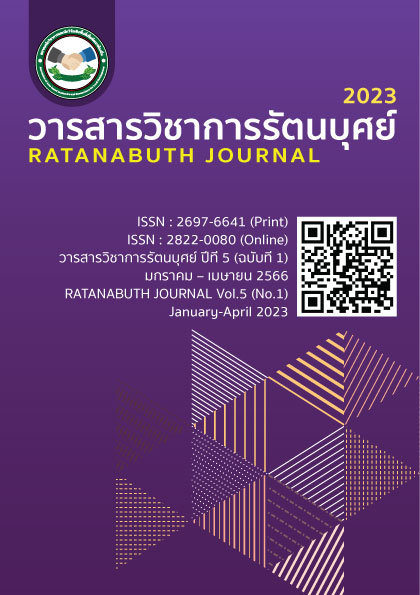Factor Analysis of Ethical Leadership of School Administrators under Secondary Educational Service Area Office Loei Nong Bua Lamphu Factor Analysis of Ethical Leadership of School Administrators under Secondary Educational Service Area Office Loei Nong Bua Lamphu
Main Article Content
Abstract
The objectives of this research were as follows : 1) study the elements of ethical leadership of school administrators under Secondary Educational Service Area Office Loei Nong Bua Lamphu, 2) to analyze the components of ethical leadership of school administrators under Secondary Educational Service Area Office Loei Nong Bua Lamphu, and 3) to test the consistency of the ethical leadership component model of school administrators under Secondary Educational Service Area Office Loei Nong Bua Lamphu. The sample were 500, directors and teachers. The data analysis was done by frequency, percentage, mean, standard deviation, Pearson's Product Moment Correlation Coefficient. The research results were as follows; 1) The results of studying ethical leadership elements of school administrators under Secondary Educational Service Area Office Loei Nong Bua Lamphu were found that academic leadership of school administrators under Secondary Educational Service Area Office Loei Nong Bua Lamphu consisted of 5 main components and 16 sub - components. The main component 1 - Fairness had 3 sub - components. The main component 2 - Trust had 3 sub - components. The main component 3 - Integrity had 4 sub - components. The main component 4 - Respect had 3 sub - components, and main component 5 - Responsibility had 3 sub - components. 2) The results of analyzing the elements of ethical leadership of school administrators under Secondary Educational Service Area Office Loei Nong Bua Lamphu were found that all the weight of 16 components passed the criterion by having weight value since 0.29 - 0.44. and 3) The results of testing the consistency of model and the empirical data with linear structural relationship model on the elements of ethical leadership elements of school administrators under Secondary Educational Service Area Office Loei Nong Bua Lamphu showed congruence with the empirical data with Chi-Square = 61.83, degree of freedom (df) = 52, P - value = 0.16504 goodness of fit index (GFI) = 0.98, adjusted goodness of fit index (AGFI) = 0.96, comparative fit index (CFI) = 1.00, Standard Root Mean Square Residual (SRMR) = 0.02 and root mean square error of approximation (RMSEA) 0.02.
Article Details

This work is licensed under a Creative Commons Attribution-NonCommercial-NoDerivatives 4.0 International License.
References
ชนะศักดิ์ ยุวบูรณ์. (2543). กระทรวงมหาดไทยกับการบริหารจัดการที่ดีในการปกครองที่ดี (Good governance). กรุงเทพฯ: บพิธการพิมพ์.
ธนเศรษฐ์ จำปางาม. (2543). การพัฒนาคุณธรรมและจริยธรรมของผู้บริหารศึกษากรณี : วิทยาลัยการสาธารณสุขสิรินธร จังหวัดขอนแก่น. วิทยานิพนธ์ ศษ.ม. ขอนแก่น:มหาวิทยาลัยขอนแก่น.
ประชุม โพธิกุล. (2550). ความกล้าทางจริยธรรมของผู้นำทางการศึกษา. กรุงเทพฯ: สถาบันพัฒนา ผู้บริหารการศึกษา กระทรวงศึกษาธิการ.
พิชญาภา ยืนยาว. (2561). การวิเคราะห์องค์ประกอบคุณลักษณะของภาวะผู้นำเชิงจริยธรรม. สาขาวิชาการบริหารการศึกษา คณะครุศาสตร์ มหาวิทยาลัยราชภัฏนครปฐม
ภารดี อนันต์นาวี (2560, กรกฎาคม - กันยายน). ปัจจัยที่ส่งผลต่อความสำเร็จในการบริหารสถานศึกษาสู่ประชาคมอาเซียน สังกัดสำนักงานคณะกรรมการการศึกษาขั้นพื้นฐานภาคตะวันออก. วารสารครุศาสตร์, 45 (3), 15.
วรารัตน์ กลั่นหุ่น. (2553). เทคนิคในการบริหารคนในการทำให้ได้รับการยอมรับในความเป็นผู้นำ. สืบค้นเมื่อ 3 มีนาคม 2565 จาก http://www.kroobannok.com/blog/38947.
วีณา วงศ์วิสิทธิ์. (2542). พุทธศาสน์. นครปฐม: ภาควิชาปรัชญาและศาสนา คณะมนุษยศาสตร์และสังคมศาสตร์ สถาบันราชภัฏนครปฐม.
ศุภลักษณ์ สุพรรณปราการ. (2555, มกราคม - เมษายน). การพัฒนาเครื่องมือวัดภาวะผู้นำเชิงจริยธรรมสำหรับผู้ริหารโรงเรียน. วารสารวิชาการ สถาบันการพลศึกษา, 9 (1), 123 - 132.
สุเทพ ปาลสาร. (2555). การพัฒนาตัวบ่งชี้ภาวะผู้นำเชิงจริยธรรมของผู้บริหารสถานศึกษาสังกัดสำนักงานคณะกรรมการการศึกษาขั้นพื้นฐาน. วิทยานิพนธ์ปรัชญาดุษฎีบัณฑิต, สาขาวิชาการบริหารการศึกษา, บัณฑิตวิทยาลัย, มหาวิทยาลัยขอนแก่น.
สำนักงานคณะกรรมการข้าราชการครูและบุคลากรทางการศึกษา.(2552). หลักเกณฑ์และวิธีการพัฒนาข้าราชการครูและบุคลากรทางการศึกษาก่อนแต่งตั้งให้ดำรงตำแหน่งผู้อำนวยการสถานศึกษา. วารสารข้าราชการครูและบุคลากรทางการศึกษา, 30, 30 - 32.
สำนักงานเขตพื้นที่การศึกษาร้อยเอ็ด เขต 3. (2551). สารสนเทศทางการศึกษางานบริหารบุคคล. สำนักงานเขตพื้นที่การศึกษาร้อยเอ็ดเขต 3.
สำนักงานเขตพื้นที่การศึกษามัธยมศึกษาเลย หนองบัวลำภู (2565). ข้อมูลสารสนเทศ. สำนักงานเขตพื้นที่การศึกษามัธยมศึกษาเลย หนองบัวลำภู
สำนักงานปลัดกระทรวงวัฒนธรรม. (2553). คุณธรรมพื้นฐาน 8 ประการ. สืบค้นเมื่อ 3 มีนาคม 2565 จาก http://www.tlcthai.com/webboard/view_topic.php?table_id=1&cate_id=70& post_id=10085
อาภารัตน์ ราชพัฒน์. (2554). การพัฒนาตัวบ่งชี้ภาวะผู้นำของครูในสถานศึกษาขั้นพื้นฐาน.วิทยานิพนธ์ปริญญา ปรัชญาดุษฎีบัณฑิต สาขาการบริหารการศึกษา บัณฑิตวิทยาลัย มหาวิทยาลัยขอนแก่น.
Brown, M. E. (2007). Misconceptions of ethical leadership: How to avoid potential pitfalls. Organizational Dynamics, 36(2), 140-155.
Catian, M. (2008). The Living Code Embedding Ethic in to the Corporate DNA. The Diamond d of Ethical Leadership. Retrieved from http://www.ethicsmanagement.info/content.php? pagina=4&type=0
Hester, J. P. (2003). Ethical Leadership for school administrators and teachers. North Carolina: McFarland.
Josephson, M. (2009). Ethical leadership outcomes Student Leader Learning Outcomes (SLLO) project. Retrieved from htt://josephsoninstitute,org/MED/MED-2sixpillars.html
Mendonca, M. (2001). Preparing for ethical leadership in organizations. Retrieved from http://findarticles.com/p/articles/mi_qa3981/is_200112/ai_n9017443/ Merriam
Marsh, R. M., & Mannari, H. (1977). Organizational commitment and turnover: A prediction study. Administrative Science Quarterly, 22(1), 57-75.
Mayer J. D., Salovey P., & Caruso D. R. (2008). Emotional intelligence: New ability or eclectic traits? American Psychologist, 63(6), 503-517.
National Centre for Ethics in Health Care. (2005). Ethical leadership toolkit a manual for the ethical leadership coordinator. Retrieved from http://www.ethics.va.gov/ntegratedethics/ELC.asp


